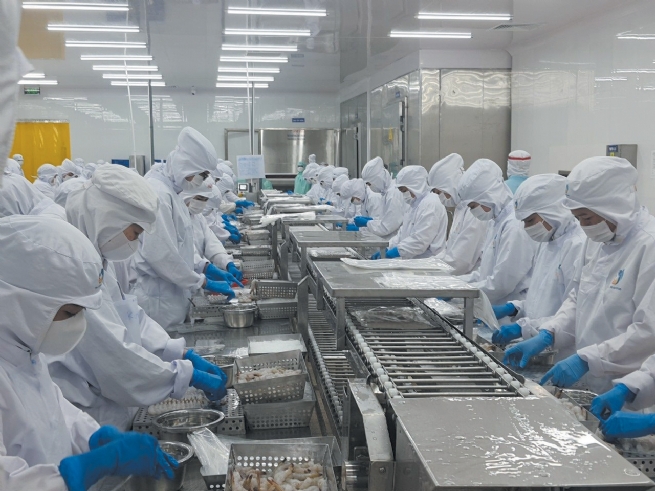The renewed growth momentum of industrial production, trade and service in Bac Lieu province has contributed positively to local socioeconomic development.

The seafood processing industry for export is an important component of Bac Lieu's industrial and trade sectors
Renewing growth momentum
The province’s Index of Industrial Production (IIP) rose by 6.62% in the third quarter and 4.3% year on year in the first nine months of 2024, with production scale expanded, technological lines upgraded and innovated, productivity, quality and competitiveness enhanced.
The export-driven seafood processing industry has played a key role, with 48 active processors with a total designed capacity of about 294,000 metric tons a year, which provide a lot of jobs for local workers, increase incomes and improve livelihoods of local people. The garment sector has gradually developed and provided jobs for more than 4,000 local workers.
Clean energy and renewable energy sectors have kept growing. Currently, the province has eight operational wind power farms on land and at sea (with a total capacity of 469.2 MW) and two projects under construction: Bac Lieu Wind Power Plant - Phase III (141 MW) and Japan - Bac Lieu Wind Power Plant (50 MW). Hence, Bac Lieu has gradually become one of the national clean energy centers.
Industrial infrastructure has also been invested. The infrastructure in Tra Kha Industrial Park has been completed, 93.48% of the rentable area leased to tenants. Lang Tram Industrial Park has been added to the National Industrial Park Planning and completed infrastructure investment procedures. Ninh Quoi Industrial Park has received many investors searching for investment opportunities. At the same time, three industrial complexes have had their detailed infrastructure construction plans approved and received some businesses seeking to invest in their infrastructure.
Regarding commercial infrastructure, up to now, the province has 63 conventional markets, seven supermarkets, six shopping malls and 23 convenience stores to meet local demand for industrial production and civil consumption.
Total retail revenue of consumer goods and services reached VND19,437 billion in the third quarter and accumulatively VND58,937 billion in the January-September period, equal to 68.69% of the full-year plan and up 5.4% year on year. The export value was estimated at US$745.46 million, equal to 64.35% of the yearly plan and up 9.13% year on year.
Speeding up sectoral restructuring
Mr. Tran Thanh Men, Director of the Department of Industry and Trade, said: In addition to favorable factors, given anticipated complicated international developments, the business community was forecast to face a lot of challenges in business operations.
Therefore, the department has urgently advised the development, amendment and supplementation of legal documents, mechanisms and policies that play an important role in local manufacturing and business. At the same time, the agency has actively proposed competent authorities to carry out innovative mechanisms and policies to boost industrial development, including industrial clusters, energy, processing and new effective business models, to create new momentum for economic growth.
The department has focused on tasks and solutions to tackle "bottlenecks" and supported businesses to recover and develop manufacturing, especially in the processing and energy industries. The agency has accelerated the implementation of industrial, energy and trade development projects, especially key ones, to put them into operation soon and help enhance the endogenous capacity of the provincial economy.
The department has enabled and stepped up more positive changes in industrial and trade restructuring in association with changing the growth model by enhancing scientific and technological application, innovation, productivity, quality, efficiency, competitiveness, autonomy, adaptability and resilience of the economy. The agency has concentrated on developing fundamental, important industries and supporting industries; prioritized the development of key industries, new technologies and advanced technologies as new driving forces for industrial and trade development.
In addition, the industry and trade sector has actively advised utilizing opportunities from foreign relations to catch redirected investment waves of multinational corporations, especially in areas where Vietnam needs and has advantages, such as electronics, digital infrastructure, logistics infrastructure, clean energy, new materials, mining and processing. At the same time, it has effectively carried out solutions to closely connect FDI firms with domestic companies to boost the development of governance skills and technology transfer, improve the competitiveness of Vietnamese enterprises, and enable smoother participation in global production and supply chains.
By Nguyen Tay, Vietnam Business Forum